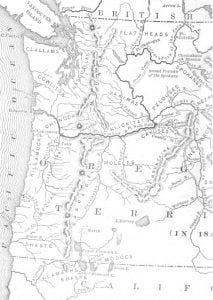Of all the interesting Indians of the Far West none are more interesting than the Navahos. The name is a Spanish one, in their orthography Nabajos or Navajos, and signifies ponds or small lakes. Their country, which abounds in these, most of them full in the rainy season and dry the remainder of the year, was originally called Navajoa, and the Indians, in the old New Mexican records, were called “Apaches de Navajoa,” which has gradually given place to the present form. The Apaches proper call them Yu-tah-kah, and they call themselves Tenuai or “men,” a title which nearly all the American tribes take to themselves in their respective languages. Their home, from our earliest knowledge of them, has been in the northwestern corner of New ‘Mexico and the northeastern corner of Arizona. It may, in a general way, be described as lying between parallels 35 and 37 of north latitude and 107 and 111 of west longitude; or east of the Moqui villages, north of Zuñi, west of the divide between the Rio Grande and the Pacific slope, and south of the Rio San Juan. Across it, from southeast to northwest, is a ridge of high land which takes a mountainous shape at the northern end. It is there known as the Sierra Tunicha; farther south as the Chusca; still to the south and cast as the Mesa de Lopos; and terminates at the southeast as the Sierra San Mateo. In the southern part is a low range called the Zuñi Mountains, and in the northwest a more rugged chain known as the Calabasa (Calavaser) Mountains.


